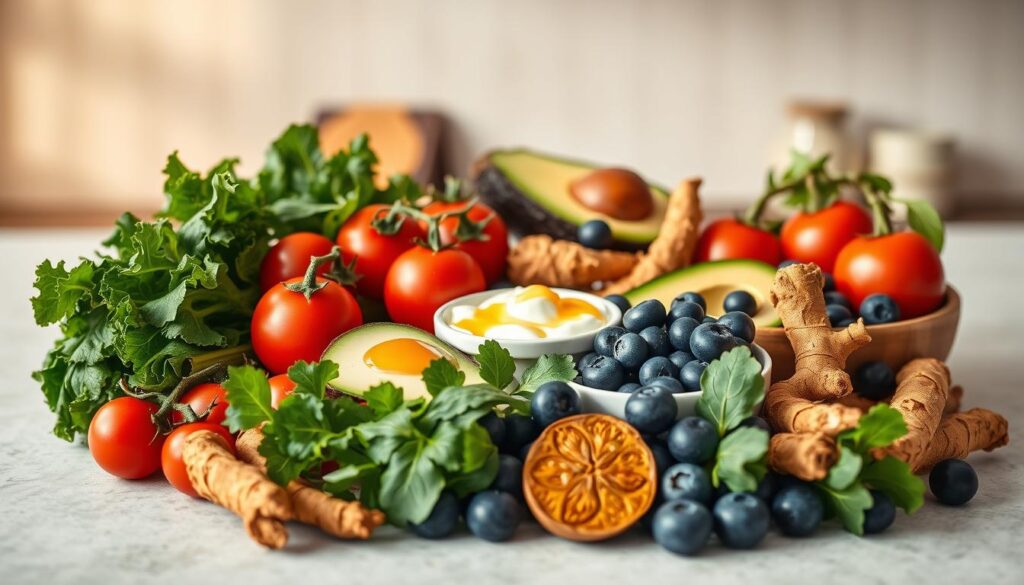Inflammation is a natural process that helps your body heal from infections and injuries.
However when this process becomes chronic, it can lead to serious health issues including heart disease and cancer. The good news is that your diet plays a significant role in managing inflammation levels.
Certain foods contain natural compounds that can help reduce inflammatory responses, promoting overall health. By incorporating these anti-inflammatory foods into your diet, you can take a proactive approach to managing inflammation and potentially reduce the risk of chronic diseases.
Understanding the connection between foods and inflammation is crucial. This article will explore the top anti-inflammatory foods that can help mitigate inflammation and promote a healthier you.
Key Takeaways
- Chronic inflammation is linked to serious health conditions.
- Dietary choices significantly impact inflammation levels.
- Certain foods contain natural anti-inflammatory compounds.
- Incorporating anti-inflammatory foods can help manage inflammation.
- An anti-inflammatory diet is backed by scientific research.
- Making informed dietary choices can reduce disease risk.
Understanding Inflammation and Its Impact on Health
Inflammation is a complex biological response that plays a crucial role in our overall health. It’s a natural defense mechanism that helps our body protect itself against injury, infection, or harmful stimuli.

What Is Inflammation and Why Does It Matter?
Acute inflammation is characterized by classic signs such as redness heat swelling, and pain. These symptoms are a protective response that helps our body defend against harm. The process is designed to be a short-term response, but when it becomes chronic, it can have detrimental effects on our health.
- Acute inflammation is the body’s natural response to injury or infection.
- Chronic inflammation can lead to long-term damage to healthy tissues.
- Inflammatory cytokines play a crucial role in the biological mechanisms of inflammation.
Chronic Inflammation and Disease Risk
When inflammation becomes chronic, it can increase the risk of developing various diseases, including cardiovascular disease, diabetes, arthritis, and certain cancers. Managing inflammation is crucial to reducing this risk and improving overall health outcomes.
How Diet Affects Inflammation
Diet plays a crucial role in modulating inflammation, with certain foods and compounds having anti-inflammatory effects. The foods we consume contain various nutrients and compounds that can either trigger or suppress inflammatory pathways in the body.
The Science Behind Anti-Inflammatory Compounds
Compounds found in foods, such as polyphenols, omega-3 fatty acids, and carotenoids, help prevent and reduce inflammation. These compounds modulate inflammatory pathways and decrease inflammatory proteins, thereby exerting an anti-inflammatory diet effect.

How Anti-Inflammatory Foods Work in Your Body
Anti-inflammatory foods work by inhibiting pro-inflammatory enzymes and cytokines at the cellular level. They also help neutralize free radicals that contribute to oxidative stress and effects of inflammation. A consistent consumption of these foods can lead to a cumulative effect, reducing overall inflammation.
Top 10 Anti-Inflammatory Foods to Add to Your Diet
With the growing understanding of how diet influences inflammation, identifying the top anti-inflammatory foods becomes crucial for a healthier lifestyle. Incorporating these foods into your daily meals can help mitigate the risk of chronic diseases associated with inflammation.
1. Fatty Fish Rich in Omega-3s
Fatty fish such as salmon, mackerel, and sardines are rich in omega-3 fatty acids, particularly EPA and DHA. These essential fatty acids have been shown to reduce inflammatory proteins and resolve inflammation. Omega-3s work by inhibiting the production of pro inflammatory cytokines and eicosanoids, thus lowering the levels of C-reactive protein CRP , a marker of inflammation.
Benefit: Reduces inflammation and may lower the risk of heart disease.
2. Colorful Berries and Their Antioxidant Power
Berries like strawberries, blueberries, and raspberries are packed with antioxidants, including anthocyanins, flavonols, and phenolic acids. These compounds inhibit inflammatory pathways, reducing oxidative stress and lowering inflammatory markers. The high antioxidant content in berries helps combat free radicals, which contribute to inflammation.
Benefit: May reduce the risk of chronic diseases by lowering inflammation.
3. Extra Virgin Olive Oil
Extra virgin olive oil contains oleocanthal, a compound that has been shown to have similar anti-inflammatory effects to ibuprofen. Oleocanthal inhibits the production of pro-inflammatory enzymes, thus reducing inflammation. Regular consumption of extra virgin olive oil has been associated with lower levels of CRP.

Benefit: May reduce inflammation and the risk of heart disease.
4. Nuts and Seeds
Nuts and seeds, particularly walnuts, are rich in omega-3 fatty acids and antioxidants like ellagic acid. Walnuts contain alpha-linolenic acid ALA , an omega-3 fatty acid that fights inflammation. The combination of healthy fats, antioxidants, and fiber in nuts and seeds contributes to their anti-inflammatory effects.
Benefit: May help reduce inflammation and support heart health.
5. Dark Chocolate and Cocoa
Dark chocolate with high cocoa content is rich in flavanols, which have been shown to reduce inflammation. Flavanols improve blood flow and lower blood pressure, potentially benefiting conditions like diabetes. The antioxidant properties of dark chocolate also contribute to its anti-inflammatory effects.
Benefit: May improve heart health and reduce inflammation.
6. Turmeric and Other Anti-Inflammatory Spices
Turmeric contains curcumin, a compound known for its potent anti-inflammatory properties. Curcumin blocks inflammatory cytokines and enzymes, potentially alleviating the symptoms of arthritis and other inflammatory conditions. Other spices like ginger and cinnamon also possess anti-inflammatory properties.
Benefit: May help manage chronic inflammatory conditions.
7. Leafy Green Vegetables
Leafy greens such as spinach and kale are high in antioxidants, including flavonoids, carotenoids, and vitamin C. These compounds combat oxidative stress and inflammation, supporting overall health. The high nutrient density of leafy greens makes them an excellent addition to an anti-inflammatory diet.
Benefit: May reduce the risk of chronic diseases by lowering inflammation.
8. Citrus Fruits
Citrus fruits like oranges, lemons, and grapefruits are rich in vitamin C and flavonoids, which have been shown to reduce inflammatory markers. The antioxidant properties of citrus fruits help mitigate oxidative stress, contributing to their anti-inflammatory effects.
Benefit: May help reduce inflammation and support immune function.
9. Avocados
Avocados are a rich source of monounsaturated fats and antioxidants like vitamin E. The unique combination of healthy fats and antioxidants in avocados helps fight inflammation and supports heart health. Avocados also contain various phytochemicals that contribute to their anti-inflammatory properties.
Benefit: May help reduce inflammation and improve heart health.
10. Green Tea
Green tea is rich in polyphenols, particularly catechins like epigallocatechin gallate EGCG . EGCG inhibits inflammatory pathways, potentially reducing the risk of inflammatory diseases. The antioxidant properties of green tea also contribute to its anti-inflammatory effects.
Benefit: May help reduce inflammation and lower the risk of chronic diseases.
How to Incorporate These Foods Into Your Daily Meals
Incorporating anti-inflammatory foods into your daily meals can be straightforward with a few simple strategies. To start, take a gradual approach by adding one new anti-inflammatory food to your diet each week.
Simple Meal Ideas and Combinations
Begin with simple breakfast options like berry smoothies with turmeric, overnight oats with walnuts, or avocado toast with olive oil. For lunch, consider leafy green salads with olive oil dressing, citrus fruits, and fatty fish or nuts. Dinner combinations featuring fatty fish, plenty of vegetables, and anti-inflammatory herbs and spices are also beneficial.
- Start your day with a berry smoothie containing turmeric and a sprinkle of walnuts.
- Prepare a leafy green salad with olive oil dressing and citrus fruits for lunch.
- Grill fatty fish and serve with a variety of roasted vegetables for dinner.
Recommended Portions and Frequency
To maximize the benefits of these anti-inflammatory foods without consuming excess calories, it’s crucial to be mindful of portion sizes and intake frequency. For example, a serving of fatty fish is about 3 ounces, while a serving of nuts is a small handful.
Consume these foods regularly, aiming for a balanced nutrition plan. Incorporate a variety of these anti-inflammatory foods into your meals throughout the week.

Foods That Promote Inflammation to Avoid
To maintain an anti-inflammatory diet, it’s crucial to identify and limit foods that can trigger or worsen inflammation in the body. Certain dietary choices can have a significant impact on our health, making it essential to be aware of the foods that can cause harm.
Processed and Ultra-Processed Foods
Processed and ultra-processed foods contain additives, preservatives, and artificial ingredients that can promote inflammation. Examples include fast food, packaged convenience foods like cookies and chips, and microwave dinners. These foods are often high in unhealthy ingredients that can trigger inflammatory responses.
Added Sugars and Refined Carbohydrates
Consuming high amounts of added sugars and refined carbohydrates can lead to inflammation. Foods made with white flour, such as cakes, cookies, bread, and pasta, cause rapid blood sugar spikes, contributing to inflammation. Limiting foods with cane sugar or corn syrup, like candy, soda, and fruit juice, is also advisable.
Unhealthy Fats and Oils
Unhealthy fats, particularly trans fats and certain vegetable oils high in omega-6 fatty acids, can exacerbate inflammation. Foods high in saturated fats, including red meat and full-fat dairy products like cheese and whole milk, should also be consumed in moderation.
| Food Category | Examples | Inflammatory Effects |
|---|---|---|
| Processed Foods | Fast food, packaged snacks | Additives and preservatives promote inflammation |
| Refined Carbohydrates | White bread, pasta, cakes | Rapid blood sugar spikes lead to inflammation |
| Unhealthy Fats | Trans fats, certain vegetable oils | Exacerbate inflammation, particularly in high quantities |
By being mindful of these food categories and making informed dietary choices, individuals can reduce their intake of inflammatory foods and promote overall health.
Creating a Complete Anti-Inflammatory Eating Plan
Developing an anti-inflammatory eating plan involves more than just adding specific foods to your diet. It requires a comprehensive approach that considers the overall quality of your nutrition and how different foods work together to promote health and reduce inflammation.
An effective plan should incorporate a variety of whole, unprocessed foods, including fruits, vegetables, whole grains, lean proteins, and healthy fats.
Mediterranean Diet as a Model
The Mediterranean diet is an excellent model for an anti-inflammatory eating plan. It emphasizes whole grains, fruits, vegetables, and healthy fats, such as those found in olive oil. This dietary pattern has been shown to reduce inflammation and promote overall health.
Key components include a high intake of omega-3 fatty acids from fish, antioxidants from a variety of colorful vegetables, and fiber from whole grains and legumes.
Balancing Your Plate for Maximum Benefits
To maximize the benefits of an anti-inflammatory diet, it’s essential to balance your plate. Aim for a variety of colors on your plate to ensure a broad intake of antioxidants and other beneficial compounds.
| Food Group | Recommended Foods | Portion Size |
|---|---|---|
| Fruits and Vegetables | Colorful vegetables, berries, citrus fruits | Half your plate |
| Whole Grains | Brown rice, quinoa, whole wheat bread | A quarter of your plate |
| Protein | Lean meats, fish, beans, lentils | A quarter of your plate |

By following this model and incorporating a variety of anti-inflammatory foods, you can create a diet that supports your overall health and well-being.
Beyond Diet: Other Lifestyle Factors That Affect Inflammation
While dietary changes are crucial, other lifestyle factors also significantly impact inflammation levels. Managing inflammation involves a holistic approach that includes various aspects of one’s lifestyle.
Exercise and Physical Activity
Regular moderate exercise is known to reduce inflammatory markers. However, both excessive and insufficient physical activity can have the opposite effect, increasing inflammation. The recommended types and amounts of physical activity for optimal anti-inflammatory effects include aerobic exercises, such as walking or cycling, and strength training, aiming for at least 150 minutes of moderate-intensity exercise per week.
Stress Management and Sleep
Chronic stress is strongly linked to increased inflammation due to the release of stress hormones like cortisol. Evidence-based stress management techniques, including meditation, yoga, and deep breathing, can help mitigate this effect. Additionally, maintaining good sleep quality and duration is critical, as poor sleep can increase inflammatory markers and disrupt immune function.
Other lifestyle factors that play a crucial role in managing inflammation include maintaining a healthy body weight, as excess fat can produce pro-inflammatory compounds, and avoiding environmental toxins and pollution, which can trigger inflammatory responses. Combining an anti-inflammatory diet with these lifestyle approaches can have synergistic effects, enhancing overall health and potentially lowering inflammation levels.
Who Can Benefit Most from Anti-Inflammatory Foods
While everyone can benefit from an anti-inflammatory diet, certain individuals may find these foods particularly helpful in managing their health conditions. An anti-inflammatory diet can help lower your blood pressure, boost your mental health and cognitive function, and relieve other chronic issues.
People with Inflammatory Conditions
Individuals with diagnosed inflammatory conditions such as rheumatoid arthritis, inflammatory bowel disease, and psoriasis may experience significant relief by incorporating anti-inflammatory foods into their diet. These foods can help reduce pain and potentially decrease the severity of symptoms associated with these conditions.
General Population and Preventive Benefits
The general population can also benefit from an anti-inflammatory diet as a preventive measure against chronic disease. By consuming nutrient-rich foods and reducing the intake of processed and high-calorie foods, individuals can maintain a healthier weight and lower their risk of developing conditions like cardiovascular health issues and type 2 diabetes, thus reaping the overall benefits of reduced inflammation.
Real Results: What Science Says About Anti-Inflammatory Diets
A growing body of evidence supports the use of anti-inflammatory diets in managing and preventing chronic diseases. This section will summarize the current state of scientific research on anti-inflammatory diets and specific anti-inflammatory foods.
Research on Inflammatory Markers
Numerous studies have investigated the impact of anti-inflammatory diets on inflammatory markers. For instance, a review of 21 studies found that drinking 100% orange juice reduced inflammatory markers significantly in healthy adults and those at risk for heart disease. Similarly, a study on carrot juice showed a significant reduction in inflammatory proteins in blood samples.
Turmeric supplementation has also been shown to have anti-inflammatory effects. A review of six studies found that it significantly reduced inflammatory markers in people with rheumatoid arthritis and ulcerative colitis.
| Food/ Supplement | Effect on Inflammatory Markers | Study Population |
|---|---|---|
| 100% Orange Juice | Reduced inflammatory markers | Healthy adults and those at risk for heart disease |
| Carrot Juice | Reduced inflammatory proteins | Healthy adults |
| Turmeric Supplementation | Reduced inflammatory markers | People with rheumatoid arthritis and ulcerative colitis |
Studies on Disease Prevention and Management
Research has also explored the role of anti-inflammatory diets in preventing and managing various diseases. The Mediterranean diet, which is rich in anti-inflammatory foods, has been shown to reduce the risk of heart disease and certain cancers. Additionally, studies have found that anti-inflammatory diets may help in managing conditions such as arthritis and inflammatory bowel disease.
The Mediterranean diet has been consistently shown to have anti-inflammatory effects, which may contribute to its protective effects against chronic diseases.
Furthermore, some research suggests that anti-inflammatory diets may have a beneficial effect on cognitive health, potentially reducing the risk of neurodegenerative diseases.
Conclusion
As we’ve explored, inflammation plays a critical role in our health, and the right foods can make a significant difference. By incorporating the top 10 anti-inflammatory foods into your diet, you can help reduce inflammation and lower your disease risk. It’s not just about temporary changes adopting a sustainable eating pattern is key to reaping the benefits. Combine this with other healthy lifestyle choices for the greatest impact. Start with small changes and consult with healthcare providers as needed.





